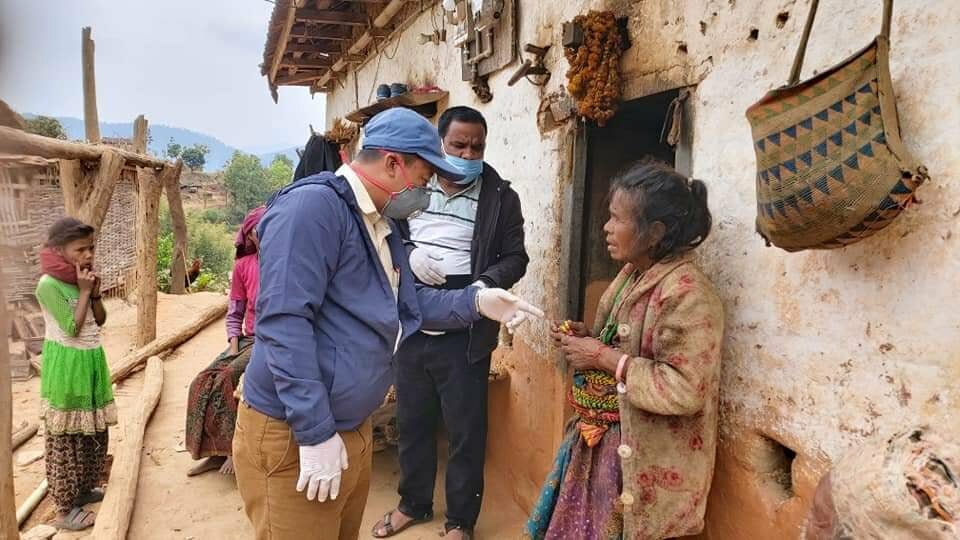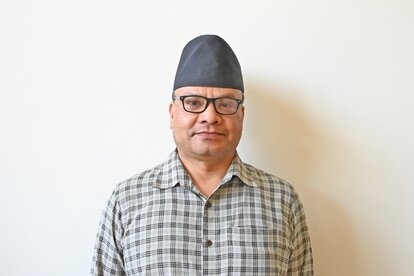Relief distribution while keeping the local economy going
Since the confirmation of the second Covid-19 case in Nepal followed by the imposition of full lockdown from 24 March 2020, local governments (or municipalities) have been doing everything in their capacity to serve their people and to fight an outbreak, despite financial and human resource constraints. They have formed coordination committees at different levels and are holding regular meetings to manage and coordinate the Covid-19 response. Their officials have been making door to door visits to raise awareness and to request respect for the lockdown. Migrants returning from various destinations are being tracked and closely monitored. People suspected of having been exposed to the virus are being instructed to self-quarantine or to remain in quarantine facilities set up by the municipalities. In many areas, they have been strictly enforcing lockdown, halting the movement of people within and between municipalities. At the same time, they have also been active in distributing food and non-food relief materials to daily wage laborers, other poor and vulnerable people and those in distress. This blog documents the activities of one rural municipality in Khotang district.
Diprung Chuichumma Rural Municipality
This rural municipality is well known to Helvetas, as it was included in the Swiss Agency for Cooperation and Development (SDC) Interim Capacity Support for Federalization Project (ICSFP). Through this project, Helvetas provided technical support to municipal representatives and staff in formulating the municipal profile, periodic development plan and revenue development plan. Both SDC and Helvetas are working to support and strengthen local government under Nepal’s new federal structure.
Food distribution
Diprung Chuichumma Rural municipality has distributed food relief to a total of 600 households across the municipality. In the first phase of relief distribution, the priority was given to daily wage laborers, Dalits, single women, disabled and landless families who are in distress due to the lockdown.
With lockdown now in its seventh week, transport and local weekly markets are closed and local agricultural products cannot be sold or transported to other markets. This has given rise to major concern amongst farmers that, after all their hard work and investment, their products will be unsold. Mr. Bhupendra Rai, Chairperson, has given the following reassurances,
"There is no need to worry that the farmers' agricultural produce will rot in the field or will not find a market during the lockdown. The municipality is collecting and purchasing all kind of agricultural produce from the farmers and ensuring a market…Lockdown due to the Covid crisis has disrupted normal life and the livelihood of the general population. In this time of crisis, it is the duty of the municipality to provide relief to the people.”
So far, the municipality has procured 468kg potatoes, 584kg cabbages, 284kg cauliflower and various other fresh vegetables from farmers of three wards. These have been distributed along with the food relief whilst respecting social distancing norms. Each food parcel comprises 25kg rice, 2kg pulses, 1kg salt and 1 liter cooking oil as well as the potatoes and fresh vegetables.
Medical assistance
Along with food relief, the municipality has been distributing medicine free of cost to those of its residents who are under regular medication and are facing supply problems. Medicines procured from local pharmacies, in accordance with individual’s medical prescriptions, cover ailments such as blood pressure, blood sugar, uric acid, gastric and ulcer, heart diseases and urinary diseases.

Immediate relief for municipal citizens stranded in Kathmandu and other urban areas
A significant number of people from Diprung Chuichumma rural municipality are temporarily resident in Kathmandu valley. This is a common phenomenon; many municipalities in a similar position have established “rescue services” to transport their citizens home, although this goes against the principles of lockdown. Diprung Chuichumma rural municipality decided otherwise, as Mr Rai explains:
"Instead of rescuing people, we provide immediate relief to our stranded citizens wherever they are. We tell them to stay where they are, contact the focal person and we will come with relief materials to your doorstep."
So far, 207 such stranded families in the valley, mainly daily wage laborers and students, have been supported by the municipality – which lies at least 10 hour’s bumpy ride some 330km from Kathmandu. The municipality is also planning to extend such support to its citizens in other towns and cities such as Gaighat, Biratnagar and Dharan. In a second phase, it is considering providing essential food support to middle-class families who originate from the municipality at concessional rates. Again, to quote Mr Rai, “Lockdown has also started to affect middle-class families. Preparations have been made to provide essential food items to them by subsidizing the cost of transportation”.
"Agricultural ambulances" for marketing fresh agricultural produce
In many other parts of the country such as Rupandehi, Kapilbastu, Palpa, Syangja, Gulmi, Pyuthan, Arghakhanchi, and Dang, municiplaities have started operating so-called "agricultural ambulances" in collaboration with relevant government and private stakeholders. The agricultural ambulances serve to collect agricultural produce – chiefly vegetables - from farmers and deliver it to urban consumers who are experiencing a shortage of fresh produce for daily consumption. In this way, they ensure the sale of local produce, supporting farmers and helping to keep the local economy going. Consumers are also happy. Similar arrangements have been made to deliver the required seeds and fertilizers back to the farmers via these “agricultural ambulances”.
The essence of federalism
Local governments (municipalities and rural municipalities) are now taking the lead in disseminating awareness messages about Covid-19, identifying and managing returnee migrants, collecting swabs and sending them for testing, building hospitals from their own budgets, and distributing relief to the poor and unemployed laborers. Being able to work like this is the essence of federalism. Coordination and mutual trust between the municipality staff including health care workers and local politicians at the front line is also good. Perhaps the current federalized structure has also strengthened this relationship and made it interdependent. According to Mr Rai,
"If there had been no elected local government in the country now, the cost of this crisis might have been far more expensive for us, and if there had been no political leadership at the local level at this moment, the scale of the crisis would have been much bigger. The Covid crisis is showing that federalism in Nepal is working."


